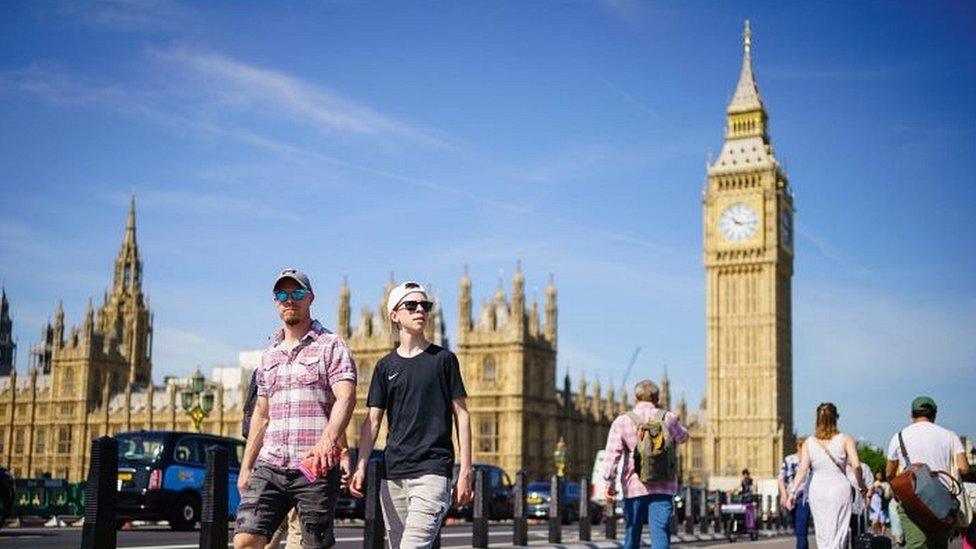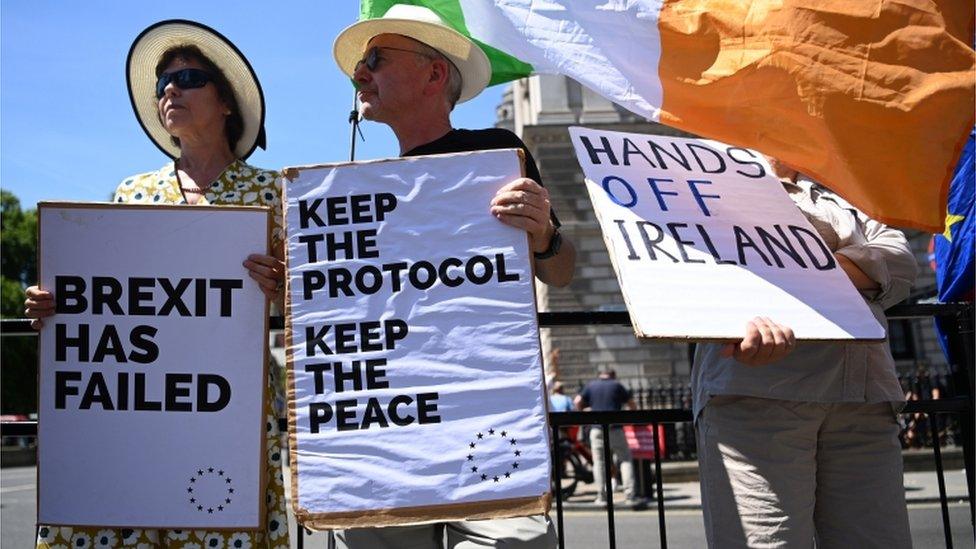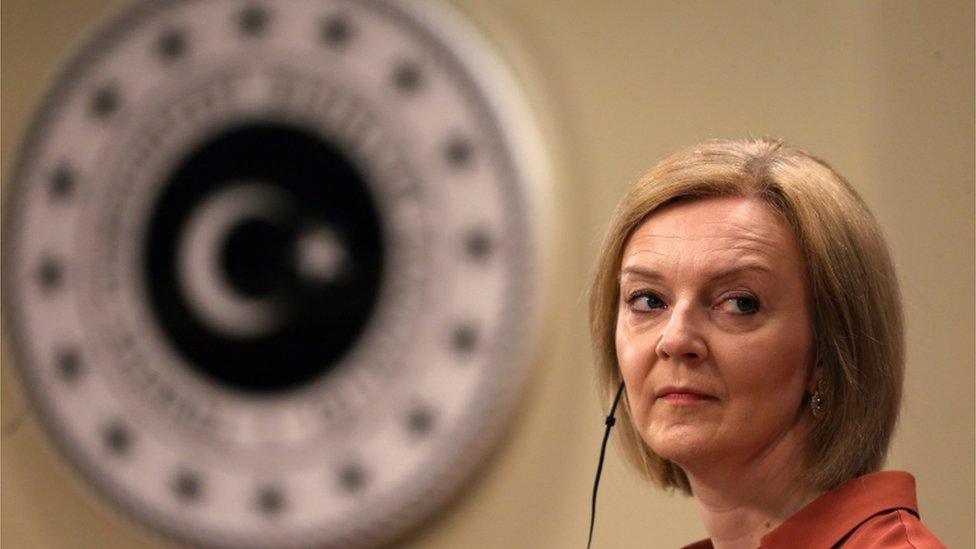What's happening in Parliament this week?
- Published

"Now it's all about keeping the show on the road until the summer recess," senior Conservative backbencher Charles Walker told me.
With some controversial legislating ahead, the aftershocks of two heavy by-election defeats for the Tories will reverberate into the coming week, and beyond.
First, there will be arrival of the two new MPs, Simon Lightwood (Labour's new Wakefield MP) and Richard Foord (Lib Dem from Tiverton and Honiton) who will take their seats in the Commons with as much theatrical flourish (photo-opportunities and carefully scripted quotes) as their respective parties can muster. So two punches onto painful Tory bruises on Monday.
But perhaps more telling will be any impact on the behaviour of Conservative MPs in Commons votes.
With the Northern Ireland Protocol Bill coming up on Monday, there will be an early opportunity for the disenchanted to express their angst, perhaps by abstention rather than voting against.
This was always going to be a difficult vote for the government but potential rebels may now be emboldened - and it will be interesting to compare the impact of the Wakefield result on Conservative MPs in so-called "red wall" seats to that of Tiverton on those in Lib-Dem facing seats.
The Tory troops will be watching out for any further resignations to follow the former party chair Oliver Dowden. Some may be dismissable as people who knew they were on their way out, but others - upwardly-mobile "future of the Party" types - would be damaging.
Some Conservatives want the prime minister to hold an immediate reshuffle and are frustrated that this is impossible while he's out of the country attending international summits. And in particular, they want Mr Dowden to be replaced by someone outside the PM's normal circle - "not an Etonian, not a millionaire", one backbencher (not Mr Walker) told me. Names like Esther McVey and Robert Halfon were suggested.

Protesters demonstrated against moves over the NI Protocol earlier in June
This is the background against which the week's parliamentary action will unfold.
Monday sees the second reading of the Northern Ireland Protocol Bill - the controversial measure which empowers ministers to disapply the Protocol and relevant parts of the EU-UK Withdrawal Agreement in domestic law, as well as giving them sweeping powers to make new arrangements in its place.
It covers removing customs checks on "green lane" goods destined to stay in NI rather than being exported into Ireland or through Ireland into the EU
It also allows changes to VAT and excise rates to be applied in Northern Ireland and removes the jurisdiction of the Court of Justice of the EU in enforcing EU rules and settling disputes over the Protocol, as well as bringing Northern Ireland fully under the UK's new subsidy control regime.
The EU is poised to take legal action if the bill is passed, and there is already talk of serious opposition in the Commons and a majority against it in the Lords.
There is already talk that the government may have to use the Parliament Act (the rarely used mechanism to over-ride objections in the Lords) to force the bill into law. So watch out for pre-emptive warnings from ministers to their own MPs and to peers.
Tuesday sees an Opposition Day debate on a subject (or subjects) to be announced. There's talk that the day had been offered to the SNP and that the offer was then declined.
Perhaps this is because the SNP First Minister of Scotland, Nicola Sturgeon, is due to announce her plans for a second Independence Referendum, and her Westminster troops don't want to steal any of her thunder - but any SNP debate would certainly have provided an opportunity for the other parties to make merry over their current internal disarray, over the sexual harassment case involving their former chief whip.
There's also a Ten Minute Rule Bill from Plaid Cymru's Westminster leader, Liz Saville Roberts, to create a new criminal offence of elected representatives making false or misleading statements.
More Northern Ireland legislation follows on Wednesday, in the shape of a committee of whole house on the Northern Ireland Troubles (Legacy and Reconciliation) Bill - which sets up an Independent Commission for Information Recovery, to investigate into deaths and serious injuries that occurred during the Troubles.
It would have power to grant immunity from prosecution to those involved, if they cooperate. That, the bill's critics say, amounts to an amnesty for perpetrators on very easy terms.
None of the Northern Ireland parties support the measure and NI Justice Minister Naomi Long told the Northern Ireland Select Committee this week that she did not see any way of amending the bill to make it acceptable to them.
Committee Chair Simon Hoare has proposed amendments to beef up the Commission, require parliamentary approval of its members and ensure its remit covers sexual offences. The Alliance Party and the SDLP have joined forces to put down amendments deleting whole sections of the bill and the DUP has a series of amendments aimed at curbing the general immunity powers in the bill.
Shadow Northern Ireland Secretary Peter Kyle has an amendment to exclude a series of sexual and child sexual offences from the immunity powers.
Keep an eye on the government response to amendments, particularly from their own side; Northern Ireland Minister Connor Burns sounded notably receptive to attempts to reshape the bill, when he wound up the second reading = or initial - debate - I wonder if his secretary of state feels the same? The detailed debate continues on Monday 4 July.
The day's Ten Minute Rule Bill, from the SNP's Carol Monaghan, would give asylum seekers permission to work, rather than depend on benefits.
Thursday sees two backbench debates: on Iran's nuclear programme and on 50 years of Pride in the UK.
Committee corridor highlights include Public Accounts (Monday, 14:00) investigating how effectively the government is tackling air quality breaches, with senior officials at Defra, the Department for Transport and Highways England.

Liz Truss was on a visit to Turkey last week
Education (Tuesday, 10:00) questions Annie Hudson, chair of the Child Safeguarding Practice Review Panel, and the chief executives and children's services directors of Bradford and Solihull Councils on child protection, following the murders of Arthur Labinjo-Hughes and Star Hobson.
Foreign Secretary Liz Truss MP is before Foreign Affairs to field questions on everything from Ukraine and the withdrawal from Afghanistan to the Northern Ireland Protocol (Tuesday 11:00).
Refugees Minister Lord Harrington is before Levelling Up, Housing and Communities (Wednesday 10:00) fielding questions about the Homes for Ukraine scheme, including delays in criminal records checks for UK hosts and of accounts of Ukrainian refugees being forced into temporary accommodation or becoming homeless.
It's a quiet-looking week in the Lords, with the main point of controversy likely to be the second reading of the Higher Education (Freedom of Speech) Bill, which seeks to protect students and academics from "cancel culture".
But keep an eye on Lib Dem Lord Redesdale's short debate on the rising cost of agricultural fertilizer and feed, which highlights one of the issues causing serious discontent in rural areas.
